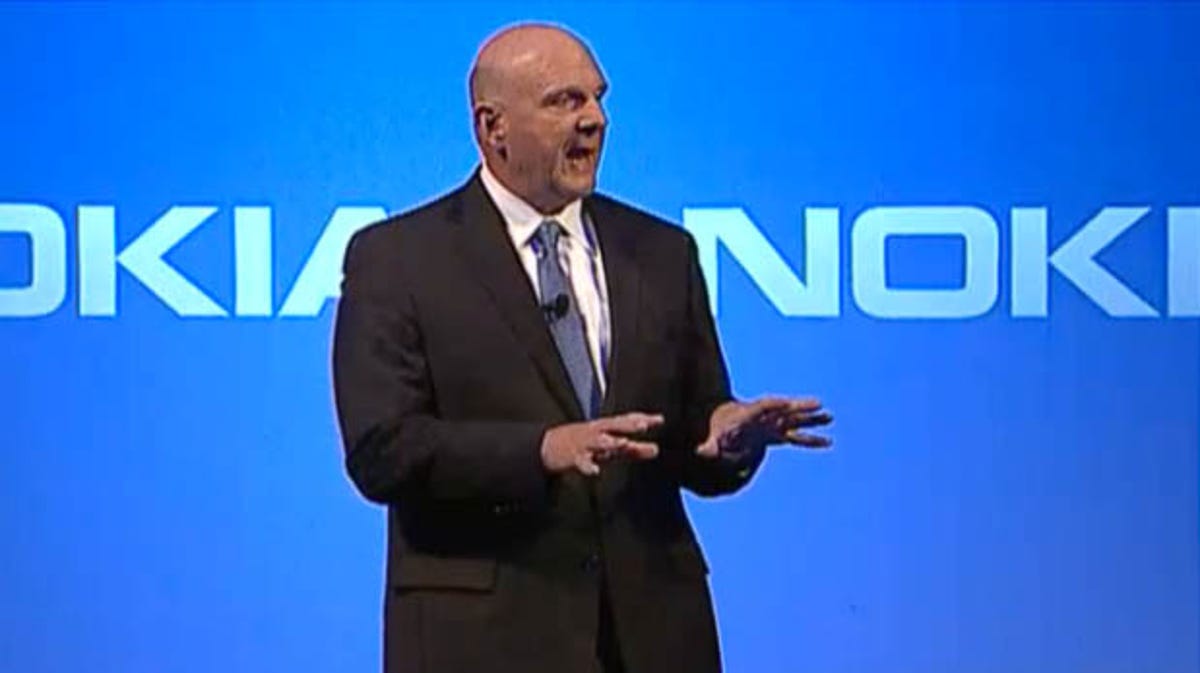The decision to sell Nokia’s devices and services division to Microsoft for $7.2 billion was a difficult choice, but market dynamics meant it was the only practical one, the Finnish company’s outgoing CEO Stephen Elop and interim CEO Risto Siilasmaa said Tuesday.
“We need more combined muscle to truly break through with consumers,” Elop said in a press conference in Espoo, Finland, where Nokia has its headquarters. “I share the frustration that comes from being so far behind two very large competitors,” he added, referring to Apple’s iOS Google’s Android, but argued that “our goal of becoming the third ecosystem is becoming real.”


Roger Cheng/CNET
Elop moved from Microsoft to Nokia to become its CEO three years ago, but Nokia announced today he’s stepping down to become executive vice president of the devices and services business. And with the deal’s expected closure in the first quarter of 2014, he’ll carry that title back to Microsoft, where he stands a chance at becoming the chief executive who’ll replace Steve Ballmer.
The deal, if it passes regulatory approvals, will profoundly change the mobile market, transforming Microsoft into more of an Apple-like company with integrated hardware and software. It’s the same move that Google made by acquiring Motorola Mobility, too.
Of course, it’s not the first time Elop has said extreme measures are required. To pave the way for the deep Microsoft-Nokia partnership around Windows Phone two and a half years ago, he penned the “burning platform” memo that said Nokia was like a person who must leap off a burning oil platform into an icy sea in order to survive. Those were bold words, and the Microsoft partnership that followed was bold too — bold enough to suggest it could be a prelude to a merger. But it wasn’t enough to rescue Nokia.
Without mobile phones, a market Nokia once dominated worldwide, Nokia will look very different, concentrating on its Nokia Here online mapping service and on the mobile broadband technology it sells to 600 carriers in 120 countries, with about 32,000 employees transferring to Microsoft.


screenshot by Stephen Shankland/CNET
Ballmer, who will retire as Microsoft CEO within a year, also touted the deal from Finland.
“Sales of Nokia Windows Phones have gone from zero, two years ago, to 7.4 million units in the most recently reported quarter,” Ballmer said. “Now is the time to build on this momentum and accelerate it further. This transaction will…strengthen the overall opportunity for us to create a family of devices and services, for individuals and business, that empower people around the globe, at home and on the go, for the activities they value most.”
Related stories
- Your Phone Screen Is Gross. Here’s How to Clean It Without Causing Damage
- Nokia’s Newest Phone Is a T9-Era Throwback With Wireless Earbud Charging Slots
- Buying a New iPhone or Android Phone? What to Look For
- 5 Tips to Make Your Android Phone Feel Like New Again
- Qualcomm Partners With TikTok Parent ByteDance on XR Devices and Software
The decision to sell off such a high-profile part of the company was “rational” but emotionally difficult, said Siilasmaa, who is chairman of Nokia’s board of directors.
“It’s evident Nokia doesn’t have the resources to fund the required acceleration across mobile phones and smart devices,” he said. “Nokia has done great work, however, the industry is becoming a duopoly with the leaders building significant momentum at a scale not seen before.”
Nokia’s fortunes were tied to Microsoft’s, but Microsoft was in a tough situation, too, Siiasmaa added.
“We cannot expect other vendors to invest as Nokia has grown to dominate Windows Phone,” he said, impairing efforts to build a broad ecosystem of hardware and software around the operating system, and Microsoft’s decision to sell its own Surface tablet hardware in 2012 also sent a strong signal to Nokia.


screenshot by Stephen Shankland/CNET
Nokia made the decision primarily based on what’s best for Nokia shareholders, Siilasmaa said. The deal will be accretive to Nokia’s profits, he said. For the first half of 2013, Nokia’s profit margin of 4 percent would have been 12 percent under the deal, said Chief Financial Officer and and interim President Timo Ihamuotila.
Microsoft also extended Nokia 1.5 billion euros ($2 billion) of credit, a deal that will go ahead even if the mobile-phone business unit fails. It’s split into three 500-million euro tranches due to be paid back in five, six, and seven years.
Nokia, a 150-year-old company that’s a fixture in Finland, will look very different split into its new businesses and the center of Microsoft’s European operations. Ballmer, Elop, and Siilasmaa made the case to Finnish employees, citizens, and regulators that the deal makes sense as the best way to provide job security for Finnish workers and economic strength for Finland.
“We are changing Nokia and what it stands for — for us, for Finland and for our consumers,” Elop said.
Siilasmaa, too, encouraged Finns to embrace the change.
“Fifteen months ago, when I was nominated to lead the Nokia board of directors, I could not foresee this particular way for Nokia to be reborn. It was a very emotional decision for me. I believe today marks a day of reinvention for Nokia,” he said. “This is the beginning of the next 150 years of Nokia’s story.”
Updated at 2:27 a.m. PT, 2:43 p.m. PT, and 3:26 a.m. PT to add further background and information and to correct the amount of Microsoft’s credit extended to Nokia. It extended credit of 1.5 billion euros.



